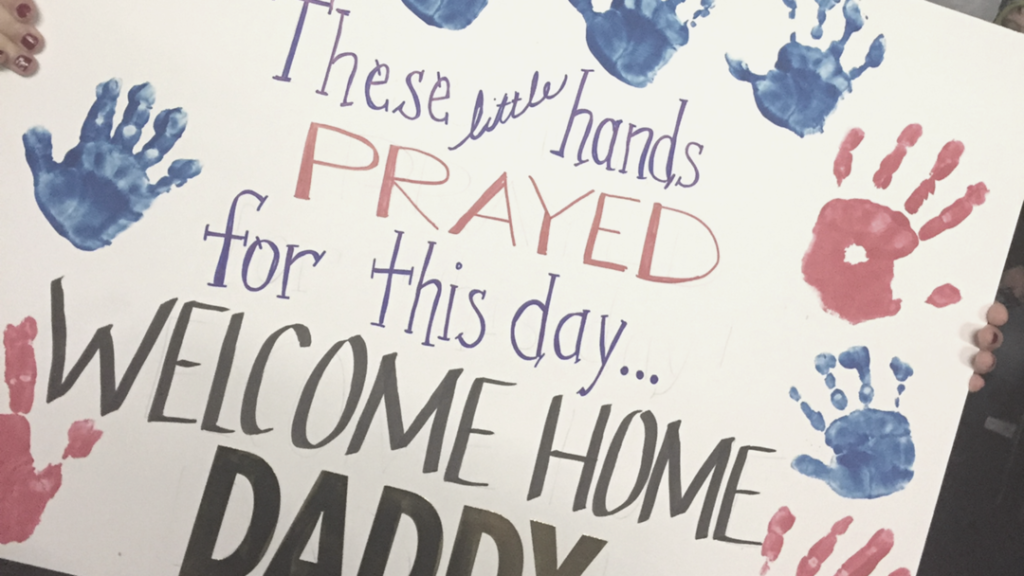
Reunion: a word that brings back many happy memories for some. The waft of summer barbecues. The clinking of a game of horseshoes. The smell of salty ocean air and personalized family T-shirts.
For others, reunion reminds them of losing those pounds gained since high school; or of the final push toward accomplishment so there is something to show for the passing years.
The Hollywood vision of military reunion is probably the most public portrayal of this lifestyle. Sailors swooping their sweethearts off their feet in the middle of a street. Soldiers surprising daughters and sons at school functions. Wives running toward husbands and children waving flags. Roses. Cute signs. Cheers. Regalia. Bands. Military homecoming looks so happy. And it is.
But it’s more than that- it’s frightening. Those moments we embrace for the first time in forever are happy. But what do we do with the remaining moments? The drive from the ship to our home. The days of leave where we spend 24/7 together after months of separation. The routine. The normalcy that gets redefined. Reintegration is hard and scary. And we should stop mascarading and pretending it’s anything but.
Reintegration looks like a wife laying in bed trembling before she goes to sleep that first night with her husband. It’s strange and unfamiliar. She’ll have to share the pillows again. It’s hard to welcome his touch after shutting off desire for months. It’s hard to quiet the clamorous thoughts: “will it feel the same? Will he notice I lost 10 lbs? Will he like the new perfume I’m wearing?” And as his fingers glide over her skin she cries- a combination of fear, happiness and relief. She’s not alone anymore. But it feels so lonely at the same time. Inside her mind she thinks, “He doesn’t know me anymore.”
Homecoming looks like a child too timid to approach his mommy because she’s returned hardened by war. Her happiness and delight in those first moments of reunion wear off into blank stares, vigilance along the roadside, distracted thoughts and wondering if she’ll ever be able enjoy this freedom she defended again. If she can be happy again. If she can have a good life with that son she happily stood in freedom’s wing for. And the child in the backseat thinks and wonders if his mommy even loves him anymore. She still seems so far away.
Homecoming is the give and take of routine being refigured. It’s sons and daughters being relieved of what were their extra responsibilities. It’s wives learning to reallow their husband to open her car door. Who will take the kids to their games? Who will do dishes after dinner? How will I carve time into life to give attention to my spouse again? Will I have any time alone again?
The Good News is always that- good news. There is good news for these tough and scary times. We can never be prepared for reunion with our loved one without the help of Christ. No self help book or readiness program can do what He did on the cross. He covers. He gives grace. He forgives.
And that’s what we must do. Military families must cover. Military families must give grace. But mostly, we must do the hardest work of all- forgive.
Covering looks like saying it’s okay your spouse doesn’t remember what day the recycling gets picked up. Covering is saying Mommy or Daddy missed that birthday, but we can celebrate together now. Covering looks like allowing our warriors to grieve, cry and mourn the loss they may have experienced, even if that’s just the loss of camaraderie with someone other than this family.
Grace looks like saying sorry when you argue about who should bathe the children. Grace is seeing your independent spouse still maintain his or her routine even though you are home- and commending them for their strength instead of resenting them for it. Grace looks like turning off the tv and telling the kids it’s been so long since you’ve played with them that you need them to help you remember.
Forgiveness is the biggest priority through it all. We need forgiveness for the time apart, for the misunderstandings, for the lack of communicating the big and little ways our hearts have changed, how our routines have changed, how our lifestyles have changed, howour thoughts and perspectives have changed. Forgiveness for making new friends both for the person on deployment and for us back at home, and expecting our spouses and families to just join in that relationship we’ve built alone for months. We may even extend forgiveness to our Nation for allowing our families to carry the burden of freedom, for allowing our children’s hearts feel the realities of a warrior’s life: real trauma, suffering, sadness and grief they barely understand, let alone process.
There’s so much more of homecoming we never talk about, never make space for, never give words to… but we need to start opening up these lines of communication so we can love each other through it. So we can normalize what feels so isolating. So we can say after reunion “this is hard.” Or “our marriage is not as happy as I thought this would be.” Or “my kids still don’t trust Daddy even though he’s been home for 6 months.” It’s time we share the truth: homecoming is hard. But the other side of that coin is that we shouldn’t be ashamed because it’s hard, either. Life feels hard when we don’t feel heard.
So it’s time we speak up, give words, and share stories of how hard these moments are, so we can receive grace and mercy from each other. So we can let others talk and share and cry and say “I didn’t think this would be so hard!”
Let’s stop perpetuating lies that say “these are supposed to be the happiest days” when you’re reunited and let’s remember the blood, sweat and tears that goes into overcoming hardship, even after our service members come home to safety.
I think military families can do redeployment well if we’re doing it loved. It’s time we create that space for each other. It’s time the Church sees this transition-homecoming- as fragile and sacred so they can support, listen and offer us love, free babysitting and maybe even some meals while we relearn one another, while we grow in grace together and while we do the gritty work of becoming One again- one day at a time.


